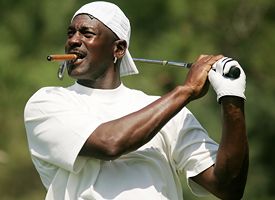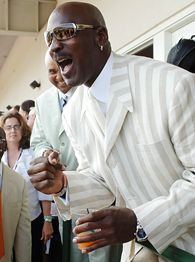Project links Black professionals, groups looking to diversify leadership ranks
Sara Murray
The Arizona Republic
Jul. 12, 2007 12:00 AM
She became involved in the Black Board of Directors Project last year.
The Phoenix-based organization, which counts more than 700 members, connected her with groups looking to add African-Americans to their leadership ranks.
"I feel like I'm bringing a different set of perspectives, and it's not only because I'm an African-American," said Henry, a director of marketing for Harrah's Entertainment.
While important strides have been made since the group was founded in 1984, leaders say they still must work to increase the number of African-American professionals, particularly within the ranks of local companies and non-profits.
"We want people to be involved in the total fabric of the community . . . not just be involved in the Black community," founder Marvin Perry said.
"Whether you're talking about art and culture, we want to be there. Whether you're talking about law and jurisprudence, we want to be there."
Perry founded the project when he noticed that companies wanted to diversify their boards but didn't know where to find suitable candidates.
"The problem was they all knew the same four or five individuals," he said.
He has helped place members on boards of non-profit organizations, corporations, and municipal, county, state and federal operations.
It can be a challenge. African-Americans make up a mere 3.1 percent of Arizona's population.
In 2000 for example, they comprised 2.3 percent of Arizona's workforce in management, business and financial, according to that year's U.S. census, the most recent data available.
They made up 2.3 percent of health care professionals and 2.6 percent of science, engineering and computer professionals.
Theressa Jackson, a member for about 20 years, was recently appointed chair of the Phoenix Women's Commission.
"When I go and tell folks I'm a member of the Black Board of Directors, I can't say enough for what that has meant for people I've tried to mentor," she said. "It can give you that support you need when you're trying to make upward mobility kind of steps."
More to do
Perry said one of his goals is to see an African-American on the Arizona Board of Regents and the board that heads the Arizona Department of Transportation.Additionally, few Black Board members serve on corporate boards.
While Perry did not have an exact count of members on corporate boards, he said it was minimal.
The Black Board of Directors has been criticized for not putting enough African-Americans on the boards of the largest companies in the Valley.
"Any person of color, if you're going to make a major change in the corporate structure, you need to be where you can affect their policy," said Wilbert Nelson, president of the Arizona state chapter of the National Association for the Advancement of Colored People.
"I don't see the companies and corporate structure actually recruiting African-Americans for paid board positions. When it comes to really putting them in a position to impact policy, there's still a way to go."
George Dean, president and CEO of the Greater Phoenix Urban league, said corporate boards are significant because they hold a sense of prestige and influence that is unmatched by public and non-profit boards.
"They're . . . the policy makers for corporations, and corporations drive the economic engine that serves the economy," he said.
The challenge with placing African-Americans on corporate boards is that most board members are former company CEOs, Perry said.
African-Americans are not very prevalent in that pool.
Arizona counted 17,230 people serving as chief executives in 2000, according to census data. Only 105 of those were African-American, about 0.6 percent.
Those affiliated with Black Board aren't shying away from the task.
"To affect change, you have to be on the inside," Jackson said. "We tried it on the outside perspective when we were doing the marches and things in the civil rights era,and that only took us so far."
Jackson said she was a student at Van Buren Elementary School, one of the seven original test schools in Topeka, Kan., following the Brown vs. Board of Education ruling.
"It may be a slower process, but it took us all these years to get where we are, so it's not like we're going to be able to shoot a cannon and change things overnight," she said.



